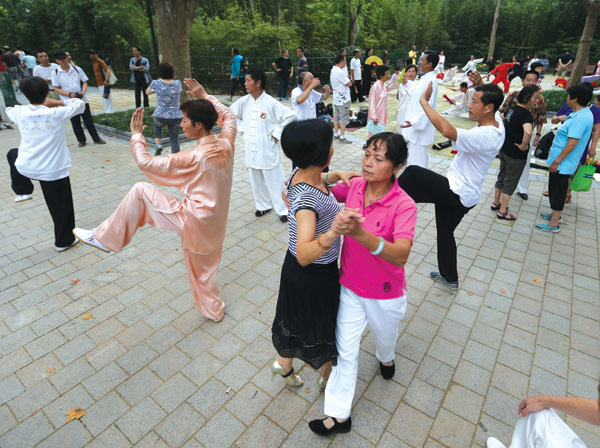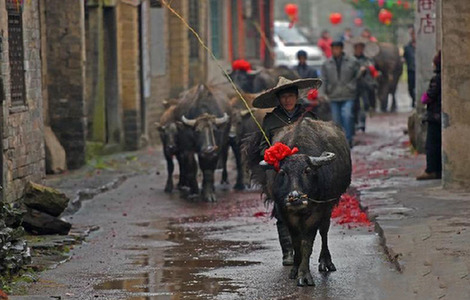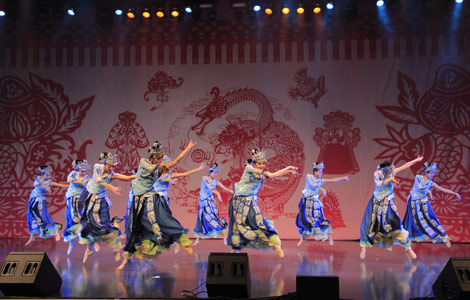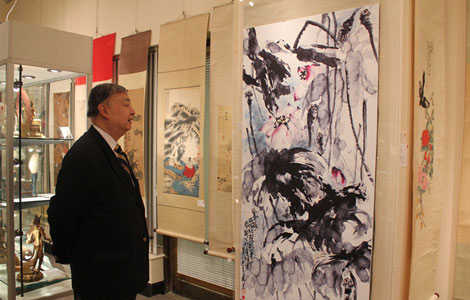'Outsiders' integrate into social fabric as attitudes change
Updated: 2015-03-20 12:16
By Yu Ran in Shanghai(China Daily USA)
|
||||||||
 |
|
It is becoming more common to see people from outside the city to take part in the local activities such as public dancing. Provided to China Daily |
City natives warming to the inrush of people from other provinces as urbanization forces them to get along.
Luo Qi knows all about the discrimination that people from the rest of China face from their Shanghainese compatriots.
Sometimes treated as second-class citizens by those born in China's financial hub, who refer to other Chinese as waidiren (outsiders), and may even refuse to let their children wed non-Shanghainese, they can feel ostracized.
"Every newcomer to the city has a hard time. It is easy to feel isolated and confused here," said the 29-year-old from Zhengzhou, Henan province.
He remembers feeling lonely and depressed after failing to grasp the several Shanghai dialects being spoken around him, which quickly created a sense that he did not belong.
Shanghai natives form an urban tribe set apart from the rest of China by language, customs, architecture, food and attitudes, writes Brook Larmer in National Geographic.
"Their culture, often called haipai (Shanghai style), emerged from the city's singular history as a meeting point of foreign merchants and Chinese migrants."
But there are signs that the tide is turning. This converges with a point in history when more educated migrant workers are swamping the city in line with China's unparalleled urbanization drive.
Around 54 percent of the population now lives in urban areas but this is expected to rise to 60 percent by 2020, according to official statistics.
As such, it is no longer possible for Shanghai natives to live in cocoons separated from those who hail from different cities and social strata, with habits or customs they may consider vulgar or at least very different.
Gradually, local residents who were born and grew up in the city, especially senior ones, are realizing they have to learn standard Mandarin, which is already overshadowing the main Shanghai dialect here in many social settings.
Zhong Qin, a 60-year-old retired nurse, could barely speak Mandarin a few years ago.
"Now I have to use it daily with my neighbors, most of whom come from different parts of the country," said Zhong. She also started learning English to communicate with her German daughter-in-law.

 5 things you may not know about the Spring Equinox
5 things you may not know about the Spring Equinox
 Solar eclipse wows viewers
Solar eclipse wows viewers
 New Year Carnival thrills Vancouver
New Year Carnival thrills Vancouver
 Across America over the week (from March 13 to 19)
Across America over the week (from March 13 to 19)
 How much do world leaders earn?
How much do world leaders earn?
 Daredevil ropejumpers leap 200 meter off cliff
Daredevil ropejumpers leap 200 meter off cliff
 Harley motorcade shows up in Boao, Hainan
Harley motorcade shows up in Boao, Hainan
 Ming art sets Christie's high
Ming art sets Christie's high
Most Viewed
Editor's Picks

|

|

|

|

|

|
Today's Top News
Six Western economies apply to join AIIB
US urged to honor pledge
Ex-wife of Chinese fugitive
to be released
China's plan to move from being 83
Investors tour Bay Area
Ex-Chinese official indicted in
money laundering
Yahoo to exit from Chinese
mainland market
Sticking it to the selfie stick as museums ban
US Weekly

|

|







